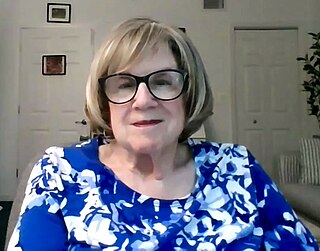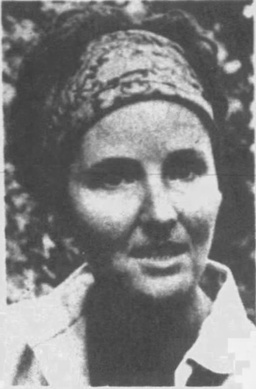
Catherine Belsey (13 December 1940 – 14 February 2021) was a British literary critic and academic.

Catherine Belsey (13 December 1940 – 14 February 2021) was a British literary critic and academic.
Belsey was born in Salisbury and attended Godolphin and Latymer School in London. She studied at Somerville College, Oxford, and subsequently as a postgraduate at the University of Warwick. [1]
Belsey was briefly a Fellow at New Hall, Cambridge. [1] She chaired the Centre for Critical and Cultural Theory at Cardiff University (1988–2003) before moving to Swansea University (2006–2014). Her book Critical Practice (1980) was an influential post-structuralist text in suggesting new directions for literary studies. [2] She was later Visiting Professor of English at the University of Derby and Fellow of the English Association and Fellow of the Learned Society of Wales. She has consistently aligned herself with international innovations in the theory and practice of criticism. Besides her profuse scholarly writing, Belsey often expressed her beliefs in the values of socialism and the importance of the humanities. [3]
Belsey has written about the effect of romance novels on modern society. [4]
Psychoanalytic literary criticism is literary criticism or literary theory that, in method, concept, or form, is influenced by the tradition of psychoanalysis begun by Sigmund Freud.
Herman Northrop Frye was a Canadian literary critic and literary theorist, considered one of the most influential of the 20th century.

Stephen Jay Greenblatt is an American literary historian and author. He has served as the John Cogan University Professor of the Humanities at Harvard University since 2000. Greenblatt is the general editor of The Norton Shakespeare (2015) and the general editor and a contributor to The Norton Anthology of English Literature.
New Criticism was a formalist movement in literary theory that dominated American literary criticism in the middle decades of the 20th century. It emphasized close reading, particularly of poetry, to discover how a work of literature functioned as a self-contained, self-referential aesthetic object. The movement derived its name from John Crowe Ransom's 1941 book The New Criticism.
Écriture féminine, or "women's writing", is a term coined by French feminist and literary theorist Hélène Cixous in her 1975 essay "The Laugh of the Medusa". Cixous aimed to establish a genre of literary writing that deviates from traditional masculine styles of writing, one which examines the relationship between the cultural and psychological inscription of the female body and female difference in language and text. This strand of feminist literary theory originated in France in the early 1970s through the works of Cixous and other theorists including Luce Irigaray, Chantal Chawaf, Catherine Clément and Julia Kristeva, and has subsequently been expanded upon by writers such as psychoanalytic theorist Bracha Ettinger. who emerged in this field in the early 1990s,

Elaine Showalter is an American literary critic, feminist, and writer on cultural and social issues. She influenced feminist literary criticism in the United States academia, developing the concept and practice of gynocritics, a term describing the study of "women as writers".
Jonathan G Dollimore is a British philosopher and critic in the fields of Renaissance literature, gender studies, queer theory, history of ideas, death studies, decadence, and cultural theory. He is the author of four academic books, a memoir, and numerous academic articles. With Alan Sinfield he was the co-editor of and key contributor to Political Shakespeare, and the co-originator of the critical practice known as cultural materialism. Dollimore is credited with making major interventions in debates on sexuality and desire, Renaissance literary culture, art and censorship, and cultural theory.

Annette Kolodny was an American feminist literary critic and activist, held the position of College of Humanities Professor Emerita of American Literature and Culture at the University of Arizona in Tucson. Her major scholarly writings examined the experiences of women on the American frontiers and the projection of female imagery onto the American landscape. Her other writings examined some aspects of feminism after the 1960s; the revision of dominant themes in American studies; and the problems faced by women and minorities in the American academy.
Steven Kevin Connor, FBA is a British literary scholar. Since 2012, he has been the Grace 2 Professor of English in the University of Cambridge and a Fellow of Peterhouse, Cambridge. He was formerly the academic director of the London Consortium and professor of modern literature and theory at Birkbeck, University of London.
Sandra M. Gilbert is an American literary critic and poet who has published in the fields of feminist literary criticism, feminist theory, and psychoanalytic criticism. She is best known for her collaborative critical work with Susan Gubar, with whom she co-authored, among other works, The Madwoman in the Attic (1979). Madwoman in the Attic is widely recognized as a text central to second-wave feminism. She is Professor Emerita of English at the University of California, Davis.
Linda Hutcheon, FRSC, OC is a Canadian academic working in the fields of literary theory and criticism, opera, and Canadian studies. She is a University Professor Emeritus in the Department of English and of the Centre for Comparative Literature at the University of Toronto, where she has taught since 1988. In 2000 she was elected the 117th President of the Modern Language Association, the third Canadian to hold this position, and the first Canadian woman. She is particularly known for her influential theories of postmodernism.
Shoshana Felman is an American literary critic and current Woodruff Professor of Comparative Literature and French at Emory University. She was on the faculty of Yale University from 1970 to 2004, where in 1986 she was awarded the Thomas E. Donnelly Professorship of French and Comparative Literature. She specializes in 19th and 20th century French literature, psychoanalysis, trauma and testimony, and law and literature. Felman earned her Ph.D. at the University of Grenoble in France in 1970.
Sous rature is a strategic philosophical device originally developed by Martin Heidegger. Though never used in its contemporary French terminology by Heidegger, it is usually translated as 'under erasure', and involves the crossing out of a word within a text, but allowing it to remain legible and in place. Used extensively by Jacques Derrida, it signifies that a word is "inadequate yet necessary"; that a particular signifier is not wholly suitable for the concept it represents, but must be used as the constraints of our language offer nothing better.

Elleke Boehmer, FRSL, FRHistS is Professor of World Literature in English at the University of Oxford, and a Professorial Governing Body Fellow at Wolfson College. She is an acclaimed novelist and a founding figure in the field of Postcolonial Studies, internationally recognised for her research in colonial and postcolonial literature and theory. Her main areas of interest include the literature of empire and resistance to empire; sub-Saharan African and South Asian literatures; modernism; migration and diaspora; feminism, masculinity, and identity; nationalism; terrorism; J. M. Coetzee, Katherine Mansfield, and Nelson Mandela; and life writing.
Poststructural feminism is a branch of feminism that engages with insights from post-structuralist thought. Poststructural feminism emphasizes "the contingent and discursive nature of all identities", and in particular the social construction of gendered subjectivities.
New Historicism, a form of literary theory which aims to understand intellectual history through literature and literature through its cultural context, follows the 1950s field of history of ideas and refers to itself as a form of cultural poetics. It first developed in the 1980s, primarily through the work of the critic Stephen Greenblatt, and gained widespread influence in the 1990s. Greenblatt coined the term new historicism when he "collected a bunch of essays and then, out of a kind of desperation to get the introduction done, he wrote that the essays represented something called a 'new historicism'".
Julia Penelope was an American linguist, author, and philosopher. She was part of an international movement of critical thinkers on lesbian and feminist issues. A self-described "white, working-class, fat butch dyke who never passed," she started what she called "rabble rousing" when she was a young woman.

Graham Holderness is a writer and critic who has published as author or editor 60 books, mostly on Shakespeare, and hundreds of chapters and articles of criticism, theory and theology. He was one of the founders of British Cultural materialism, a pioneer of critical-creative writing, and a significant contributor to interdisciplinary work in Literature and Theology.

Charles Moseley, who also publishes as C. W. R. D. Moseley, is an English writer, scholar, and teacher, and a former fellow of Wolfson College and Life Fellow of Hughes Hall in Cambridge, as well as a fellow of the English Association, the Society of Antiquaries of London, and the Royal Society of Arts.
Teckyoung Kwon is a literary critic, translator and professor in English literature at the School of English, Kyung Hee University, Seoul, South Korea. Her research interests are psychoanalysis, ecology, American and British fiction, narrative theory, neuro-humanities, Korean literature and Dao.